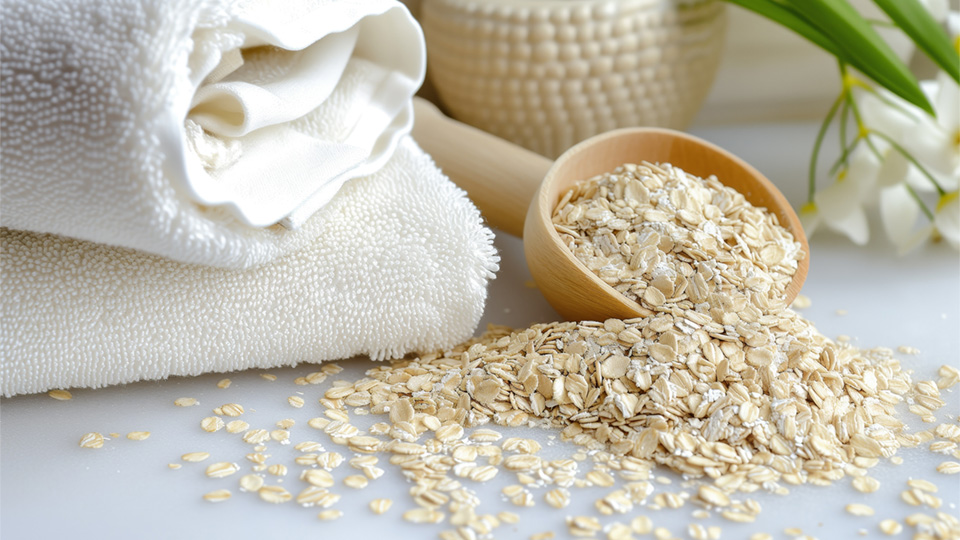Two NEA Ambassadors, One Powerful App
How NEA's free EczemaWise app helped two members of the eczema community take control of their care.

Published On: Apr 3, 2025
Last Updated On: Apr 3, 2025
Bathing is often a frontline defense against itching for eczema. Finding a good bathing routine that works for your skin is a crucial step of managing your skincare routine, especially if you have a skin condition like eczema. If you’re looking for a remedy to stop itchiness, you might be wondering if an oatmeal bath is a good option for you.
“If you’re struggling with day-to-day itching even after moisturizing and standard interventions — and you’re still really, really itchy with a lot of discomfort — oatmeal is a good natural place to start,” said Morgan Maier, PA-C, a physician assistant in dermatology at Seattle Children’s who specializes in treating children with eczema.
A colloidal oatmeal bath is a hydrating bath made with finely ground oatmeal. The properties in the oatmeal help reduce itch and improve hydration and pH balance of the skin, Maier said.
These soothing baths are a natural remedy that can help relieve symptoms of several skin conditions, including eczema. “[Colloidal oatmeal] helps soothe the skin and has properties in it that help reduce irritation,” Maier explained. “It also creates a coating on your skin, so it can create a shield that can help block harmful irritants and give you relief from irritation. It’s calming in and of itself, but it also creates this layer of protection on your skin.”
The difference between regular oatmeal and colloidal oatmeal is how the oatmeal is processed. “Colloidal oatmeal is ground down to a consistency or particle size where it will dissolve completely in water, so it will be evenly dispersed,” Maier explained.
According to Dr. Mamta Jhaveri, a dermatologist with Kaiser Permanente in Gaithersburg, Maryland, there are three ways oatmeal baths help sooth eczema: 1) They have an antioxidant effect, 2) they have anti-inflammatory effects and 3) they help with hydration.
“Oats have polyphenols called avenanthramides, which have natural antioxidant and anti-inflammatory benefits that help to diminish feelings of itchiness and discomfort,” Maier explained.1
Colloidal oatmeal also contains vitamin E, which is an antioxidant that helps protect against oxidative stress and inflammation.2 Oats also have prebiotic properties, which support a balance of good bacteria on the skin microbiome to help balance the skin’s microbiome, Maier said.
“Oat lipids support a moisture barrier. The starches and beta-glucan in oats attract water to the skin and form a protective barrier that helps maintain moisture,” Maier said.
You can buy colloidal oatmeal packets from the drug store, or you can make it yourself at home.
To make it at home, grind oatmeal down to a particle size where it dissolves in water and creates a milky solution when added to water. “If you take a pinch of it and put it in water and it sinks to the bottom, it’s not fine enough and you need to keep grinding it,” Maier said.
Use one store-bought colloidal oatmeal packet per bath, or about 1/2–1 cup of homemade colloidal oatmeal in one bathtub full of lukewarm water, suggested Dr. Jhaveri. Soak in the bath for 10 to 15 minutes. She also recommended mixing the oatmeal in while the bath is filling so that the pressure of the water mixes it up easily.
Dr. Jhaveri said that colloidal oatmeal baths can be done two to three times a week, and, if you are really itchy or experiencing an extreme flare, it is also safe to take one every day.
“I wouldn’t use it more than once a day. That could then also lead to irritation because you’re bathing more often,” Dr. Jhaveri said.
Colloidal oatmeal baths can be beneficial for pretty much anyone with dry, irritated skin, Dr. Jhaveri said. She recommends it for atopic dermatitis, psoriasis, poison ivy and most types of eczema.
“The only type of eczema I would be cautious about [using a colloidal oatmeal bath] is if you have a known contact dermatitis or allergen,” she said.
Maier and Dr. Jhaveri said colloidal oatmeal baths are safe for kids and even babies but recommend that parents should be sure to keep kids from getting water in their eyes or mouth. Parents should take special care to make sure children don’t put bath toys in their mouth during an oatmeal bath.
However, they both recommend being a little more cautious and speaking with a doctor if you’re treating a baby under six months because of concerns about food allergies or sensitivities to gluten. If you or your child has celiac disease, an oatmeal bath might cause more irritation if you have topical sensitivity to gluten, Maier said.
References: